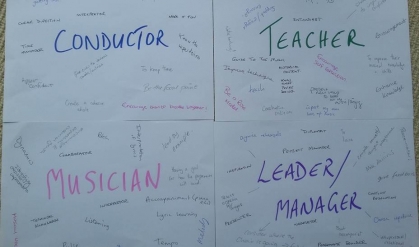Adapting to Context on the abcd Conducting Skills Day
 The group's analysis of the conductor's roles
The group's analysis of the conductor's roles
Last Saturday gave me the treat of working in my home city, leading a Basic Conducting Skills day on behalf of the Association of British Choral Directors. I love events like these; the participants are always so engaged and dedicated to their singers, and so supportive to each other as they learn together. And they always come with such great questions, straight from coalface of practical problem-solving.
One of the things I found interesting about these questions was the way the answer so often included the caveat that best choice often depends on the context. The size of choir, the genre expectations and musical habits that come from them, the needs of that particular collective of singers. The decision about how to proceed then becomes a matter of figuring out the range of possibilities, and locating your particular circumstances within it.
Here are some of the subjects they raised:
- To what extent should warm-ups be routine, or to what extent should you change them around? Unity and variety are useful things in warm-ups, as in music. The value of routine is that it allows you develop skills systematically, giving singers confidence. The value of mixing things up is stimulation, encouraging mental alertness and learning flexibility. And which value you’ll emphasise depends on your choir’s situation. If it has experienced a lot change and needs a sense of stability, then routine brings calm and cohesion; if it has plateaued in development and is tending to sing on cruise-control, then variety will help kick-start the process of change.
- To what extent do you have to beat time all the time, or can you stop beating time to show other things? If you are working in a literate tradition where you get through a lot of music, and people are reading, you’ll need to keep the pattern there pretty much continuously so that people can glance up and down from music to conductor and always find where they are. If you are working in a tradition that works by memorising, so people know the music better and are looking at you more continually, you’ll need much less continuity of pattern. If you are in a tradition that has a lot of body movement, you’ll have effectively out-sourced metre to you singers’ lower bodies so you probably need very little pattern at all.
- Working with children who need help remembering the music, should I focus on showing them rhythm/tempo or pitch? This one is interesting because there is a default right answer, as well as the range of possibilities. In general: go for rhythm/tempo as standard as that is the foundation of getting people to sing together. But inflect this with the needs of the music and of the singers – if actually what they need help with is pitch, then respond to their needs. This question came with the specification of working with children, but I think the answer generalises to adults too.
- Should I place less confident singers near more confident ones for support, or will that make them too dependent? The balance to be struck here is to provide enough support to allow people to participate, but to start removing it as soon as practicable to wean them off relying on it as a matter of course. We talked about ways to turn the process of moving people out of their safe spots into a game to make it less scary. Inviting people to go and stand next to someone they’d never stood next to before, or to invite people to spread out round the room, gives the singers some control over their placement at the moment you removing their habitual support
Reflecting back on this theme of judgements made in context, the thought that emerges for me is that there are often two questions to consider. What does my choir need right here, right now? And, what will my choir need in the future? If we only consider the first, then we risk holding our singers back. The balance between these two probably comes down to the urgency of the need. Sometimes the here-and-now needs our help and there’s no point attempting anything else until the immediate needs are met. But in calmer times we can keep an eye on our future selves and work on setting up rehearsal habits and skill-bases that they’ll find useful.
...found this helpful?
I provide this content free of charge, because I like to be helpful. If you have found it useful, you may wish to make a donation to the causes I support to say thank you.
Archive by date
- 2024 (19 posts)
- 2023 (51 posts)
- 2022 (51 posts)
- 2021 (58 posts)
- 2020 (80 posts)
- 2019 (63 posts)
- 2018 (76 posts)
- 2017 (84 posts)
- 2016 (85 posts)
- 2015 (88 posts)
- 2014 (92 posts)
- 2013 (97 posts)
- 2012 (127 posts)
- 2011 (120 posts)
- 2010 (117 posts)
- 2009 (154 posts)
- 2008 (10 posts)











